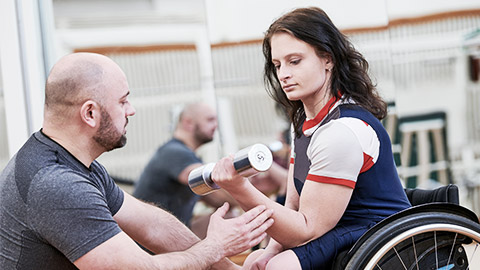Welcome to Collaboration and Referral!
In this topic, you'll learn about your ethical responsibilities and professional boundaries, including following a code of conduct and staying within your scope of practice. You'll also learn the importance of collaborating with healthcare professionals, such as general practitioners, dietitians, and physiotherapists and referring clients when appropriate.
We'll explore the different professions you may collaborate with as a personal trainer. Referral and collaboration with allied health care professionals and others can help you provide optimal care when coaching special populations.
We’ll cover:
- Code of conduct
- Scope of practice and referral
- General Practitioners
- Dietitians
- Pharmacists
- Physiotherapists
- Occupational Therapists
- Mental health and addictions
- Complementary and alternative medicine
- Sports coaches
- Organisations involved in the care of special populations

The fitness industry is governed by codes of conduct that exercise professionals must adhere to in New Zealand. 2 of the most important codes are the NZ REPs Code of Ethical Practice and the ExerciseNZ Code of Ethics. It is important for exercise professionals to be aware of and abide by these codes of conduct to ensure the safety and wellbeing of their clients, as well as to maintain the reputation and integrity of the fitness industry as a whole.
NZ REPs Code of Ethical Practice
The NZ REPs Code of Ethical Practice emphasises the importance of maintaining a high degree of professionalism and ethical conduct in the industry. This code includes 5 principles that all registered exercise professionals are expected to follow. These principles include:
- Uphold professional standards
- Maintain safety
- Appropriate relationships
- Respect privacy
- General professionalism
Download the Code: REPs Code of Ethical Practice.
Breaches of the Code
In the event of a breach of the code, individuals can make a formal complaint to REPs, and a disciplinary panel will review the case and make binding decisions. Potential sanctions for violating the code include suspension or termination of REPs registration, a reprimand or formal warning, or other determinations the panel considers appropriate.
ExerciseNZ Code of Ethics
Adhering to the ExerciseNZ Code of Ethics is essential for personal trainers operating in clubs that are members of ExerciseNZ.
This code outlines the expectations for ethical conduct and professional standards within member clubs. Key principles include:
- Provision of a secure exercise environment
- Pre-screening of members for medical conditions
- Continuous improvement of professional knowledge
- Avoidance of false claims
- Prohibition of high-pressure sales tactics
- Protection of clients' privacy
In addition, trainers must adhere to the code's policies regarding membership terms and conditions, transfer policies, and the use of drugs or performance-enhancing substances.
Download the Code: ExerciseNZ Code of Ethics.
Access the sub-codes: Membership Terms and Conditions and Use of Drugs/Performance Enhancing Substances.
Individuals can make a formal complaint to ExerciseNZ if there has been a breach of the Code.
Other codes
In addition to these codes, gyms and fitness centres may also have their own codes of conduct that trainers must follow if operating in the facility.
Importance of adhering to the Codes when working with special populations

Exercise professionals can make a positive impact on the health and wellbeing of special populations by following the codes of conduct and ensuring that they are providing safe and effective exercise programmes.
Understanding the codes of conduct outlined by NZ REPs and ExerciseNZ is particularly important when working with special populations. Clients in these groups often require specialised training programmes that take into account their unique needs and health conditions. By adhering to these codes, you can ensure that you are providing safe and effective exercise programmes that are tailored to your special population clients' needs.
For example, one of the principles outlined in the NZ REPs Code of Ethical Practice is maintaining safety.
Maintain Safety
Registered Exercise Professionals will:
- Prioritise the health and safety of participants, including meeting all obligations under the Health and Safety at Work Act 2015
- Ensure that every participant has been appropriately pre-screened
- Never advocate or condone the use of prohibited drugs, or banned performance enhancing substances
- Identify and respect the physical limits and ability of participants
This is especially relevant when working with clients with physical limitations or health conditions requiring extra precautions. Exercise professionals must ensure that they follow appropriate safety protocols and modifications for each client to prevent injury and avoid exacerbating health conditions.
Similarly, the principle of respecting privacy is important when working with clients who may be self-conscious about their weight or physical abilities. Exercise professionals must be sensitive to their clients' needs and provide a supportive environment that fosters confidence and trust.
When working with special population clients, you must recognise when to seek assistance for any serious health problems identified. Your role is limited to providing exercise advice, and you should collaborate with qualified health professionals for medical issues. Providing nutrition, mental health counselling, or other specialised services outside your expertise is not allowed.
Being aware of your limitations is crucial to working within your scope. It is also important to remember the language used when requesting the client to seek further health advice from health professionals. Remember, you cannot diagnose a client with a health issue, but you can make a professional recommendation that they seek further support to help support their exercise and fitness programme with you.
Scope of practice
You should be familiar with your scope of practice determined by REPs registration and your qualification. Take a moment to read the scope of practice documents.
Read:
- NZ REPs Scope of Pratice
- NZ REPs Foundation Level Requirements
- NZ REPs Exercise Prescription Level Requirements
Pay special attention to limitations. Personal trainers are not endorsed to:
- Provide physical or health rehabilitation
- Undertake postural analysis
- Provide personalised nutritional advice
Therefore, if a client needs physical or health rehabilitation, a postural analysis, or personalised nutrition advice, you must refer to a qualified practioner.
Working with health professionals

Health professionals are qualified practitioners with specialised expertise in diagnosing, preventing, and treating various illnesses and conditions.
On occasion, you may have to refer your client to an external health professional before you begin training or during the course of your training sessions. Like in the nutrition module, there are instances where it may be beneficial for your client to seek help from someone like a registered nutritionist or dietitian, and this of course can be applied to other aspects of health.
You may also need to work alongside or collaborate with health professionals or other health-related service providers to ensure your client receives the level of care appropriate for their needs.
Typically, in New Zealand, you refer to a General Practitioner (GP) as your client's primary care provider who will then refer to a specialist. However, there are certain circumstances where you can go directly to the specialist.
Common concerns
Let's consider some scenarios you may come across as a personal trainer.
Negative remarks about body, low energy/mood, unusual eating patterns
Your client is making remarks about their body, having low energy and mood, or unusual eating patterns like skipping meals throughout the day only to eat large portions of “junk” when they get home.
You should refer them to their GP with the intention of referral to a dietitian or psychologist as well as getting things checked out like blood tests for hormone imbalances or nutrient deficiencies.
Experiencing pain
Your client makes remarks about or experiences pain when performing certain exercises or has difficulty using the regular equipment at the gym.
You should refer them to a Physiotherapist, Osteopath, Chiropractor, Occupational Therapist, or Podiatrist (with or without GP referral first) to help with these issues.
Sports supplements
Your client wants to try different sports supplements, but you know they take some medications for things like high blood pressure, cholesterol, diabetes, mental health or really any other medications.
You should refer them to their GP or a pharmacist to discuss potential drug interactions.
Signs of stress, mood changes, or feeling anxious
Your client is exhibiting signs of stress, abrupt changes in mood, feeling anxious, discussing fears and concerns, not being interested in what you are doing in the gym even though they were loving it a couple months ago.
Have a chat about referring to a mental health professional or their GP.
Collaborating with other professionals
You may need to collaborate with non-health professionals to support your clients such as sports coaches. Your client may not be a professional athlete, but they may attend multiple sports practices and games throughout the week so understanding the types of movements/exercises they are performing during these sessions is important to plan appropriate intensities and volume to their training.
When working with other health professionals, especially when you specifically refer your client to someone, it is important that you focus on promoting services that are evidence-based and have a well-known regulatory body in New Zealand.
Let’s look into the different health professionals and associations in order to gain a better understanding of their roles and qualifications.
Watch

General Practitioners (GPs) are healthcare professionals trained to provide holistic treatment by considering the entire body and environment. They are experts in diagnosing various medical conditions, even at an early stage, and know when and where to refer patients for further investigations or treatment.
GPs can recognise, advise, treat, or refer patients with any medical or emotional condition, regardless of the severity or complexity. They have undergone at least 10 years of medical training and provide continuous services throughout a person's life. Meaning, they can provide advice on the needs of individuals of any age, from babies with a fever to elderly people with memory loss.
GPs are trained to actively listen and observe, enabling them to identify symptoms patients may have missed. They work with patients to improve their conditions by offering the best possible care and referring them to other healthcare professionals if necessary.
Doctors vocationally registered in General Practice have appropriate qualifications and experience that allow them to be registered with the Medical Council of New Zealand as specialists in General Practice. Therefore, GPs are highly competent, knowledgeable, and skilled professionals who can provide quality healthcare services to their patients.
Primary healthcare
GPs are primary healthcare providers. Primary healthcare is a part of the health service that operates from the community and is usually a person's first point of call.
These places have many different names around the country, e.g., Medical Centre, Family Doctor, Family Health Centre, or GP Surgery. The official term is Primary Care Practice. This term recognises that other health professionals like practice nurses, psychologists, and midwives are often based there, not just doctors. Primary healthcare is where most consultations and referrals start and most treatment occurs. Even when patients get referred to specialists in secondary care (often at a hospital), their GP (doctor) is kept informed of progress and sent a report when they are sent home.
Collaboration with GPs
As a personal trainer, you may need to collaborate with a GP when providing services to your client. The following table will provide you with a few examples.
| Pre-existing medical conditions | To create a safe and effective exercise programme that considers a client's medical needs and limitations, it may be necessary to work together with a GP. |
|---|---|
| Injury or illness | You may need to collaborate with a GP to modify the exercise programme or recommend alternative exercises that will not exacerbate any injuries or illnesses that may be present. |
| Medications | Your client might be on medications that may affect them during exercise. E.g., blood thinners might impact their blood pressure or heart rate. You may need to collaborate with the GP to adjust the exercise programme. |
| Medical clearance | In some cases, you may need to obtain medical clearance from your client’s GP before beginning an exercise programme. Especially if the client has any medical conditions that may increase the risk of exercise-related complications. In this case, you would need to collaborate with the GP to ensure the client is medically cleared to participate in the exercise programme. |
Be mindful that most referrals to health professionals require a referral from a general practitioner. If you think your client needs a psychologist, don't assume. Instead, suggest that they speak to their GP, who can refer them to a psychologist if they think it's appropriate.

A dietitian focuses on the client’s nutrition and dietetics. Their role is to help their patients achieve and maintain optimal health through the foods they eat. Dietitians help to develop nutrition plans that meet their client’s specific needs. They provide education on proper nutrition, including food choices, portion sizes, and meal planning, and work with clients to help them make lifestyle changes that promote better health.
A dietitian is an allied health professional. This means they are part of the allied health workforce which is made up of health professionals who are not part of the medical, dental or nursing professions. Allied health professionals are autonomous practitioners who work in various healthcare settings and often work in multidisciplinary teams. The allied health workforce is regulated in 2 ways, national regulation under the Health Practitioners Competence Assurance Act 2003 (HPCA Act) or are self-regulated by a professional body.
The term 'dietitian' is a protected term. A dietitian is a registered health professional who meets standards required by the Dietitians Board and has an undergraduate science degree in human nutrition and a post-graduate qualification in dietetics. To practise in New Zealand, a dietitian must, by law, be registered with the Dietitians Board and hold a current practising certificate.
You can read about what dietitians do, where to find credible healthy eating information and recent position statement and submissions made by Dietitians NZ at Dietitians NZ. You can also access their Find a Dietitian database.
Collaboration with dietitians
Remember, as a personal trainer, you can only give limited advice on nutrition and meal plans. By working together with a dietitian, you can provide your client with a comprehensive approach to health and wellness that addresses both exercise and nutrition, leading to better health outcomes for the client.

The role of a pharmacist is to dispense medication, provide advice and guidance on medication use, and promote the health and wellbeing of their clients. Pharmacists are highly trained health professionals who ensure that their patients receive the appropriate medications and doses while monitoring potential drug interactions and side effects.
Pharmacists are involved in all aspects of medicine delivery to patients. They will prepare and package medication that a doctor has prescribed and also sell medication over the counter. Pharmacists will explain what your medicine is for, how it works, what to expect when taking the medication and what to look out for.
A pharmacist may be based within a hospital, healthcare facility, or community pharmacy. They will have a degree in Pharmacy which provides them with an understanding of the biochemical mechanisms of drugs, drug uses, therapeutic roles, side effects, potential drug interactions, and monitoring parameters.
Pharmacists are allied health professionals and are registered with the Pharmacy Council. The Pharmacy Council make sure pharmacists are qualified, registered, and competent and they monitor education and training programmes. You can search for registered pharmacists on the Pharmacy Council's website.
Collaboration with pharmacists
You may collaborate with pharmacists or refer through to a pharmacist to support your client with:
- Medication review: Pharmacists can review a client's medication regimen to ensure that it does not interfere with their fitness plan. E.g., some medications may cause drowsiness or affect the heart rate, which could affect exercise performance.
- Supplement advice: Pharmacists can advise on the safety and efficacy of different supplements and provide guidance on proper dosing and potential side effects.
- Injury prevention and management: Pharmacists can provide advice on over-the-counter medications and products that can be used to prevent and manage injuries. E.g., they can recommend pain relievers or topical creams for muscle soreness or joint pain.
- Health education: Pharmacists can provide education on various health topics, such as nutrition, sleep hygiene, and stress management. This education can complement the advice and guidance provided by the personal trainer and help clients achieve their health and fitness goals more holistically.
Collaborating with a pharmicist can help ensure that your special population clients receive holistic care that addresses their medication use, nutrition, and physical fitness goals. This can lead to improved health outcomes and a better quality of life for your clients.

A physiotherapist assesses and treats patients affected by an injury, disability, or health condition. They help patients to improve movement and pain.
They develop individualised treatment plans for their patients, which may include exercises, manual therapy, and other interventions designed to improve movement and reduce pain. They may also provide education and advice on injury prevention and management.
Physiotherapists can help with the following:
- Planning and providing an exercise programme for clients to increase strength and movement.
- Massaging or manipulating areas of the body to relieve pain and stiffness.
- Providing information and advice on general lifestyle, body movement, and postures to prevent injuries.
- Providing services such as acupuncture to improve pain.
- Providing mobility aids or devices such as crutches to help clients move around.
Physiotherapists are allied health professionals. A physiotherapist has to do 4 years of training and be registered with the Physiotherapy Board of New Zealand to work in New Zealand. You can search the register to find physiotherapists currently eligible to practice in New Zealand.
Some physiotherapists are more specialised and have more training in certain areas. These areas include:
- Acupuncture
- Cardio-respiratory
- Hand therapy
- Manual therapy
- Mental health
- Neurology
- Occupational health
- Older adults
- Paediatric
- Pelvic, women’s and men’s health
- Sports and exercise
Special populations can benefit from working with a physiotherapist. Some medical conditions that can improve with physiotherapy include:
- Arthritis
- Strains and sprains
- Sports injuries
- Incontinence
- Back pain, neck pain, shoulder pain
- Fractures or broken bones
- Rehabilitation after a heart attack
- Recovery after surgery
- Lungs and breathing problems such as COPD or cystic fibrosis
- Neurological conditions such as Parkinson's disease, stroke or multiple sclerosis
- Developmental delays in children
Collaborating with physiotherapists
Personal trainers can work with physiotherapists in various ways to provide comprehensive care for clients. This includes referring clients for injury management, rehabilitation, and specialised training. You can also collaborate to develop programmes that address a client's specific needs and goals while minimising the risk of injury. Overall, collaboration between personal trainers and physiotherapists can help ensure that clients receive the best possible care for their health and fitness needs.
Remember that your scope of practice prohibits providing physical or health rehabilitation, and undertaking postural analysis. These are areas a physiotherapist may be able to assist with.

An occupational therapist, commonly known as 'OT', works with people of all ages who have limitations after an injury, illness, or difficult life circumstances. Their goal is to help their clients carry out daily activities, care for themselves, and stay active by using purposeful activities, interventions or equipment.
Occupational therapists also work with families and caregivers to help clients participate in social interactions and relationships. Some occupational therapists specialise in certain areas, such as children and young people, older people, and people with physical disabilities, mental health conditions, or learning disabilities.
The following lists some conditions of special populations that occupational therapists may work with:
- Stroke or brain injury
- Alzheimer’s disease
- Spinal cord injury
- Developmental disabilities such as autism or cerebral palsy
- Arthritis
- Mental health and behavioural problems
- Neurological disorders such as Parkinson's disease, Cerebral palsy or multiple sclerosis
- Visual impairments
- Post-surgical rehabilitation
- Hand and foot injuries
- Nerve injuries (World Brain Centre, n.d.)
Occupational therapists are allied health professionals. They have to do a 3 year training qualification at university and be registered with the Occupational Therapy Board to work in New Zealand. You can search the register for OTs eligible to practice in New Zealand.
Collaborating with occupational therapists
Occupational therapists can play a valuable role in helping clients at a gym achieve their physical and functional goals while minimising the risk of injury and maximising their overall wellbeing. Collaborating with an occupational therapist will ensure special population clients receive thorough care to promote independence, self-management and/or improvement to quality of life.
OTs can provide guidance on equipment selection and modifications to help clients overcome physical limitations and participate in exercises that may have otherwise been difficult or impossible. E.g., an occupational therapist may recommend a different type of resistance band or modify the grips on weightlifting equipment for a client with limited hand strength.
OTs can also help clients set achievable goals and track their progress towards those goals, providing motivation and encouragement along the way. They can also work with clients to address any psychological or emotional barriers that may be preventing them from participating in physical activity or achieving their goals.

If a client is feeling mentally unwell or struggling with addiction, their initial point of contact should typically be their family doctor or GP. GPs are trained to assess, treat, and manage many mental health issues. If necessary, a GP can refer a client to a local mental health service or another suitable facility. In some cases, they may be able to assist the client in managing their mental health without having to refer them to any other services.
Mental health and addictions health professionals are trained and licensed experts specialising in diagnosing and treating mental health conditions and substance abuse disorders. They include psychiatrists, psychologists, social workers, mental health counsellors, eating disorder services, and addiction specialists. These professionals work in various settings, including hospitals, clinics, private practices, and community health centres.
Services
There are a range of services to support mental health and addictions including:
- Helplines
- Peer/advocacy/support/family whānau support
- Community-based
- Non-acute specialist mental health community services
- Crisis/acute mental health
- Intake and assessment
- Disability support (mental health)
- Eating disorders
- Smoking cessation
- Addictions - drug and alcohol
- Maternal mental health - clinical and community
- Refugee/migrant
- Residential support
- Respite
- Supported employment
- Forensic
You can access a full list of services at Health Navigator.
The most common referral path for clients with mental health or addictions concern will be their GP. A GP can then refer through to a community mental health service if the client meets referral criteria.
Individuals can also access private therapists and mental health professionals. Low cost mental health care may be available through the client's GP, their workplace EAP (Employee Assistance Programme), tertiary institutes counselling services, and youth centres. Individuals can also search for private therapists using the following databases:
- NZ College of Clinical Psychologist
- NZ Psychological Society
- NZ Association of Psychotherapists
- Royal Australia and New Zealand College of Psychiatrists
- Talking Works (professional counsellors)
- NZ Association of Counsellors
- NZ Christian Counsellors Association
The Ministry of Health has a range of digital tools, resources, and helplines available on the MoH website.
Mental health is health
In recent years, there has been a growing recognition of the importance of addressing mental health and addiction issues in the context of overall health and fitness. As such, mental health and addictions services can play an important role in helping fitness clients achieve their goals and improve their overall wellbeing.
One way mental health and addictions health professionals can help fitness clients is by identifying and addressing any underlying mental health or substance abuse issues that may be contributing to or exacerbating their physical health problems. E.g., a client struggling with depression or anxiety may have difficulty adhering to an exercise programme or maintaining a healthy diet. Addressing these underlying mental health issues can help improve the client's motivation and ability to stick to their fitness goals.
Mental health professionals can work with fitness professionals to develop integrated treatment plans that address both physical and mental health needs. This can include collaborating with personal trainers and dietitians to develop exercise and diet plans that complement mental health and addiction treatment programmes.

Complementary and alternative medicine (CAM) refers to medical practices or products that are not considered standard medical care. When used alongside conventional medicine, it is referred to as complementary, while when used instead of conventional medicine, it is considered alternative.
CAM encompasses various areas such as complementary and alternative therapy, natural medicine, herbal remedies, non-conventional medicine, and holistic medicine. Examples of CAM include:
- Acupuncture
- Aromatherapy
- Ayurveda
- Traditional Chinese medicine (TCM)
- Chiropractic therapy
- Herbal products and dietary supplements
- Homeopathy
- Massage
- Osteopathy
- Rongoā Māori
Acupuncture, chiropractic manipulation, and osteopathy are funded by the Accident and Compensation Corporation (ACC) in New Zealand.
Some of these practices or products are regulated and are allied health professionals, e.g., osteopathy and chiropractic therapy. But many are not. Remember, it is important that you focus on promoting services that are evidence-based and have a well-known regulatory body in New Zealand.
You can read more about CAM on Health Navigator.

A sports coach assists athletes at all levels in physical, psychological, and tactical aspects of their sport to help improve sporting ability and sports specific exercise.
Possible roles of the sports coach are:
- Coaching and sport training
- Managing domestic, national, and international sport
- Personal training
- Sport co-ordination in school or community programmes
Collaborating with a sport coach can help you determine suitable exercises that can support the physical needs that the specific sport requires from your client. This means that it can help your client improve their performance within that sport.
Even if your client is not a professional athlete, any social or non-professional sports they play are worth noting. This allows you to ensure your programme design considers additional training and game days.
A wide range of services are available in New Zealand to support different special population groups. The following are examples of organisations and programmes that can provide services to clients.
Sport New Zealand and High Performance Sport New Zealand
Previously known as the Hillary Commission (1995 - 2001) and SPARC (2002 - 2008).
Sport NZ is a kaitiaki (guardian) of the play, active recreation, and sport system in New Zealand. The organisation promises and supports quality experiences in play, active recreation, and sport to improve physical activity levels and wellbeing of New Zealanders. Sport NZ Group includes High Performance Sport New Zealand, which leads the high performance sport system, supporting athletes and coaches nationally and internationally.
Their strategic direction includes the Sport NZ Ihi Aotearoa Maori Activation Plan, a focus on young people, and building collective resolve to grow physical activity levels in New Zealand.
Watch
Watch the video to see how Sport NZ wants to help get every body active, including special population groups.
Head to their website to read more about Sport NZ.
Age Concern New Zealand
Age Concern New Zealand is a charity dedicated to people over 65, their friends, and whānau. They promote dignity, wellbeing, equity, and respect and provide expert information and support services in response to older people's needs.
They are active and vocal on relevant issues and work to ensure older people stay connected with their family, friends, and community.
One of the services Age Concern offer is health promotion. This includes falls prevention education, strength and balance classes, physical activity groups, and nutrition courses and workshops for older people. Some Age Concerns offer wellbeing expos, sleep seminars and mindfulness/mental wellbeing sessions. Collectively, they enable older people to participate and stay healthy and connected in their community.
Watch
Check out this short ad for International Day of Older Persons from Age Concern.
Halberg Foundation
The Halberg Foundation is a charitable organisation founded on the belief that all people, regardless of ability, should have equal opportunity to enhance their lives through sport and recreation. The organisation work with physically disabled young people and their families to get them involved in sports and recreation. They collaborate with schools, local sport and recreation organisations, facilities, and clubs to raise awareness and capability for inclusive sports programmes and events.
Watch
Watch this short video from Attitude about the Halberg Foundation and Paralympians.
